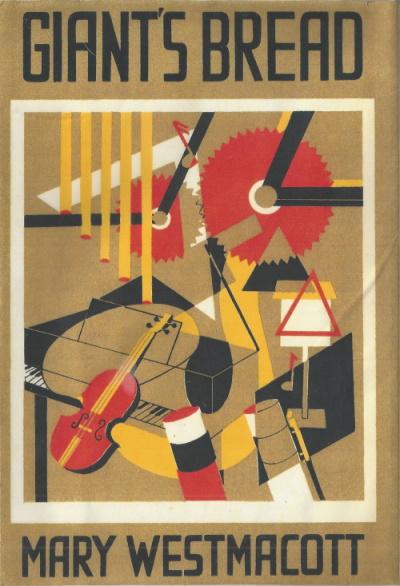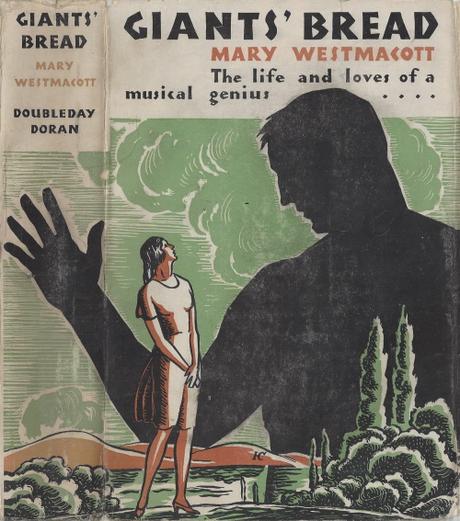Book review by George S: This is the first of the novels that Agatha Christie published under the name of Mary Westmacott. It is an odd book, though an interesting one. (Warning: The review contains spoilers.)
 Cover of the first English edition.
Cover of the first English edition.
It begins with a prologue, the opening night of a new opera, The Giant, by an unknown Russian composer. Sebastian Levinne, the impresario, is listening to interval comments. There is mention of a talented British composer, Vernon Dayre, killed in the war. Levinne is asked about the origins of the new opera…
At which we flash back to the 1890s, and the start of the novel proper.
It begins well, with a depiction of Vernon Dayre’s childhood, seen mostly through his eyes. He is brought up in a country house called Abbotts Puissant – and his love for this country estate is an important feature of the novel. It’s way outside of the usual Agatha Christie social range.
Young Vernon tries to understand the adult world, but he is happier with his imaginary friends, Mr Green, and Poodle, and Squirrel and Tree. His mother is loving but possessive, and his father, who had married her for her money, is a charming man, but a weak one, a philanderer who gets one of Vernon’s nursemaids into trouble. The marriage is viewed unsentimentally, and seems a precursor of the complicated marital relationships revealed in Christie’s later novels.
The neighbouring family, the Levinnes, are Jewish; Vernon and his cousin Joe (a girl) make friends with Sebastian, the son of the family. The book’s treatment of Jews is interesting. Sebastian is by far the nicest character in the book, and later on acts as a fairy godmother to others, especially Vernon. So the book can not be called anti-Semitic – but all the other Jews are stereotypes – interested in money and speaking with a lisping accent. In the early part of the book, Christie/Westmacott is clearly amused by the way that the Jewish family buy their way into local society.
An oddity about Vernon is that that he has a hatred of music and avoids listening to it; he thinks of the house’s grand piano as a Beast with a multitude of teeth. Clearly he is frightened of its potential power over him.
After going to Eton and Oxford, though, he one day has a revelation. He is persuaded to go to a concert, and suddenly realises, what music might be, and determines to become a composer. This introduces the weakest part of the book. Christie seems to have no idea of what composition entails, and the idea of a young man with no musical training whatever, or any sense of a musical tradition, suddenly becoming a serious composer is unconvincing, to say the least.
During the post-Oxford period, Vernon has to choose between three young women. There is Enid, who has money, but is a wet blanket; there is Nell, who is very pretty but conventional; there is Jane, who is older than Vernon, an actress and a bohemian. If he married Enid, he would have the money to keep up Abbots Puissant and pursue his dream as a composer. If he married penniless Nell life would be difficult, and he would have to get a job. Marriage to Jane is not something he really considers.
This plays out at some length, with Nell finally so frightened of a precarious future that she marries George, a wealthy older man. Vernon has an opera produced (by Sebastian, now a powerful impressario). Jane ‘s performance makes the show a success, though she has been warned by the doctors to stop singing to save her voice. He never really realises the sacrifice she has made for him. But Nell returns to Vernon, having decided that marriage to wealthy George was a mistake.
There is a lot of emotional turmoil in these chapters, and it becomes more and more the stuff you find in novels, and less and less like real life.
Then the First World War happens, and the novel improves for a while. Vernon has gone off to fight, and Nell and volunteers in a hospital (as Christie/Westmacott had done). These chapters havethe ring of lived experience. It is particularly good on the friction between the VAD volunteers and the established nursing sisters. (Partly caused by class uncertainties and rivalries.) I’ve also recently read a later Agatha Christie novel (Sad Cypress, 1934) and exactly these nurses are there again, with their taste for strong tea and their sense of entitlement. Giant’s Bread is also sharply observant of the difference between the way the doctors treat their private patients and the way they treat those who have come for free treatment at the hospital. In later Christie novels, doctors often turn out to be not very nice characters. Is her war experience at the root of this?
But after this dose of realism, Christie/Westmacott goes all out for wartime melodrama. There is the statutory episode of the fateful telegram from tht War Office:
She let herself into the house very quietly with her latch-key. Her landlady always went to bed early. On the tray in the hall was an orange-coloured envelope. She knew then … Telling herself that it wasn’t—that it couldn’t be—that he was only wounded—surely he was only wounded … yet she knew …
After Vernon’s death, Nell is persuaded to sell Abbots Puissant, and only later realises that the buyer is her first husband, George, who still loves her. She agrees to marry him again, persuading herself that this is what Vernon would have wanted.
But (big spoiler!) Vernon is not dead after all. He had been a prisoner, escaped, read about George and Nell’s wedding in a random British newspaper, and then was knocked down by a lorry and lost his memory.
Here Christie/Westmacott is using tropes often found in novels of the early twenties – the soldier returning to find his wife or lover married to someone else, and the shell-shocked amnesiac trying to make sense of his life again. I’ve read early twenties books by Ruby M.Ayres, Dornford Yates and Warwick Deeping that wring drama out of these themes. By 1930, I’d suspect they must have seemed very old-fashioned to sophisticated readers. As early as 1919, Somerset Maugham had got wonderful sophisticated fun out of the situation of the returning soldier whose wife had remarried, in his farce Home and Beauty.
Amnesiac Vernon has become George Green, car mechanic, and coincidence takes him to Abbott’s Puissant. Revelations ensue, but he chooses to disappear to Russia rather than reclaim Abbots Puissant.. While his memory had gone he had no interest whatsoever in music, but now it comes back to him, and he composes an operatic masterpiece (financed by Sebastian). The piece is full of deep serious symbolism about the future of mankind. (and just about the opposite of the average Christie novel.)
There is a big climax on an ocean liner which, like the Titanic, hits an iceberg. Vernon must make a choice who to save – Nell or Jane. Then he’s haunted by guilt because (another spoiler) in an instinctive moment he chose the wrong one.
What kept striking me as I read this book was that it uses themes very popular in the early twenties. And it struck me especially in the letters sent home from Russia, full of excitement about Tatlin’s Memorial for the Third International, a sensation of 1920 – surely old hat by 1930.
I wonder whether this book was written back in the very early twenties, at about the same time as the first proper Christie novel, The Mysterious Affair at Styles. That one was a success – but was this one rejected by publishers? And did Christie maybe keep an affection for it, and in 1930, when secure in her fame as the Queen of crime writers, wanted to give it a chance. It seems to have gained some respectful reviews, but it’s noticeable she didn’t publish any more by Westmacott for more than a decade.
So it’s an oddity, and a bit unsatisfactory, but I’m glad I read it.
 Cover of the first American edition.
Cover of the first American edition.
